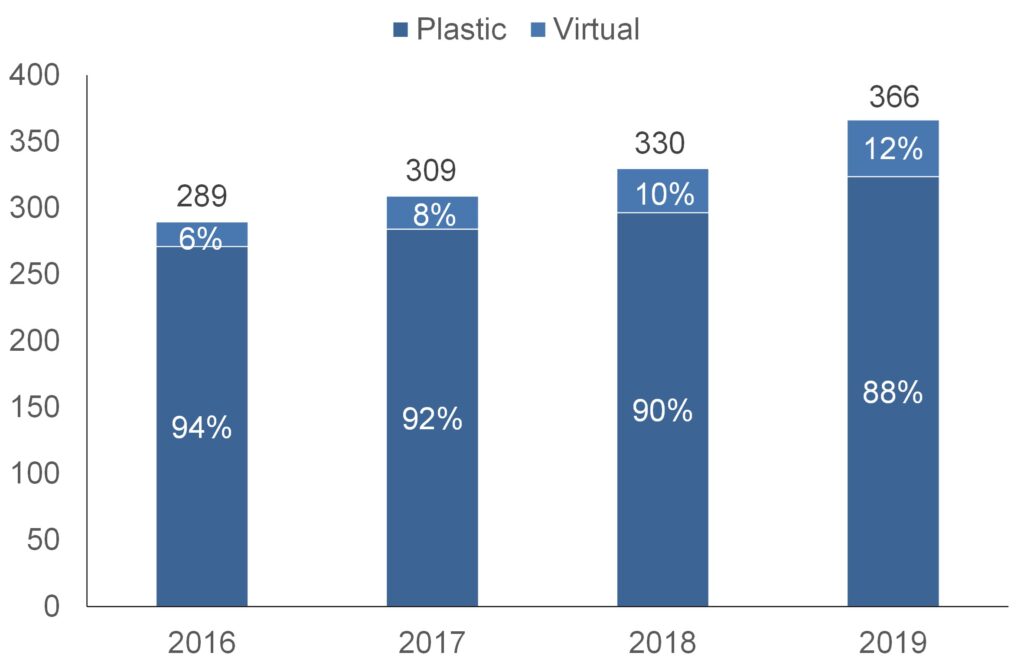Virtual Cards to Provide Catalyst for Commercial Card Spending
Virtual cards will unlock untapped potential in the commercial cards sector thanks to the extra security, control and efficiency they provide
Rising proportion of European commercial card spending is virtual
An impressive €42.7 billion was spent on European virtual commercial cards in 2019, accounting for 12% of total commercial card spending, according to RBR’s 19-country study: Commercial Cards in Europe 2021. Virtual card expenditure in the region increased at an average of 32% per year between 2016 and 2019.
Virtual commercial cards are digital card numbers generated centrally or instantly issued, which are distinct from tokenised versions of plastic cards in mobile wallets. They are offered primarily by specialists, but increasingly also by traditional bank issuers.
European plastic and virtual commercial card expenditure (€ billion)

Source: Commercial Cards in Europe 2021 (RBR)
Virtual cards are widely used for booking flights and other procurement
The RBR study reveals that cards associated with travel represented 83% of European virtual commercial card spending in 2019. These include Lodge cards, which are held at travel management companies to pay for their client companies’ flights and other travel expenses. Virtual cards are also used by online travel agencies, such as Expedia, to pay their supply chain (e.g. airlines, hotels and car rental firms).
Virtual Purchasing cards, which are used to facilitate procurement, are also gaining traction. They are used, for example, for office supplies in Poland, managing subscriptions, such as for software packages, in Spain, and social media advertising in Norway. Purchasing cards accounted for 17% of virtual card expenditure in the region in 2019.
Virtual cards are especially advantageous for temporary and remote staff
Security and control are two major advantages of virtual cards. An obvious security benefit is that, unlike physical cards, virtual cards cannot be lost. In addition, virtual card numbers are often generated to settle a specific invoice and expire after use, thereby preventing fraudulent usage. For multi-use virtual cards, company administrators may define the maximum spending amount and the merchant sectors where usage is permitted.
Virtual cards also allow for enhanced efficiency given that they can be issued quickly and easily where it is costly or impractical to issue a plastic card. The growing number of temporary workers and, especially since the outbreak of the COVID-19 pandemic, home-based employees, has made virtual cards a more compelling option for many firms.
Changes in payment behaviour favour virtual cards
The travel restrictions imposed as a result of COVID-19 represent a short-term inhibitor of virtual cards given that many are used for travel-related expenses. As the travel sector recovers, high double-digit growth in virtual card spending is expected to resume.
Chris Herbert, who led the research for RBR commented: “Virtual cards will play a major role in shaping the future of the commercial cards sector as the pandemic has accelerated the shift to online payments. Going forward, the expansion of NFC acceptance will also open up more opportunities in face-to-face payments, with virtual-only cards embedded in mobile wallets increasingly substituting plastic cards”.
Notes to editors
These figures and insights are based on RBR’s study, Commercial Cards in Europe 2021. For more information about this report or to discuss the findings in more detail please email Chris Herbert ([email protected]) or phone +44 20 8831 7305.
About RBR Data Services
RBR Data Services provides clients with independent and reliable data and insights through published research, consulting and bespoke data services. Our global research covers the cards and payments, retail technology and banking automation sectors and is used by the leading market participants, analysts and regulators as the authoritative source of industry and competitor benchmark data. For any questions about this release, please contact [email protected].
About Datos Insights
Datos Insights delivers the most comprehensive and industry-specific data and advice to the companies trusted to protect and grow the world’s assets, and to the technology and service providers who support them. Staffed by experienced industry executives, researchers, and consultants, we support the world’s most progressive banks, insurers, investment firms, and technology companies through a mix of insights and advisory subscriptions, data services, custom projects and consulting, conferences, and executive councils. For more information, please contact [email protected].
The information and data within this press release are the copyright of Datos Insights and may only be quoted with appropriate attribution to RBR Data Services, a division of Datos Insights. The information is provided free of charge and may not be resold.
